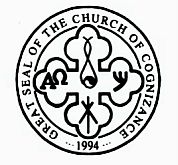Cognizance is believed to have been first used in the 14th century, which also was the century of the English Peasants' Revolt of 1381 (cache)
The word 'Cognizance' comes from Latin gnöscere meant 'know' (it is related to know and notion). From it was derived the compound verb cognöscere 'get to know, recognize, acknowledge.' It's present participial stem cognöscent- formed the basis of a Vulgar Latin noun *connöscentia, which passed into Old French as connoissance. English borrowed this as conisance, restoring the Latin g to the spelling in the 15th century, which eventually effected the pronunciation. Also from the Latin present participle came Italian conoscente, which in its latinized form was borrowed into English as cognoscente in the 18th century. Meanwhile, the past participial stem of the Latin verb, cognit-, produced the noun cognitiö, source of English cognition in the 15th century.
The infinitive form of the Latin verb passed into Old French as connoître, from which was derived the agent noun connoisseur, borrowed into English in the 18th century (modern French has connaisseur).
Related words are acquaintance, cognition, connoiseur, know, notion, reconnaissance, reconnoitre.
cog•ni•zance
1. Noun: awareness, knowledge, realization, perception, understanding: 'everyone had cognizance of the truth'
2. Law:
a. Judicial notice as taken by a court over a cause.
b. to have Juridiction: 'it is within your cognizance to act as your conscience directs when in a manner not harmful to the health, safety, or welfare of others.'
3. in heraldry: a symbol, badge, or emblem giving recognition of belonging to persons or property.
4. in Church of Cognizance:
a. persons whom have joined together for the common benefit of all and to manifest cognizance of the fact that so long as a person does not injure any other person or their property they act within cognizance of their natural and unalienable right, equally bestowed upon all, to maintain cognizance over matters effecting their Life, Liberty, and Pursuit of Happiness.
b. persons with cognizance of the truth about the, history, true effects, and many benefits of the cannabis, hemp, marijuana, plant they refer to by the ancient term Haoma, and of the demonization of this plant of nature for the "unjust enrichment" of several industrial giants "at the detriment of all others and society in general".
